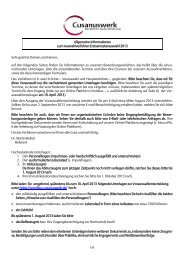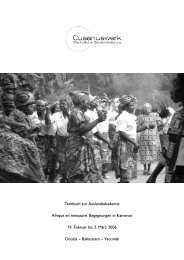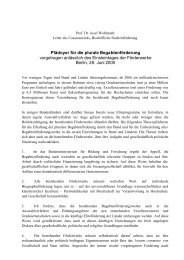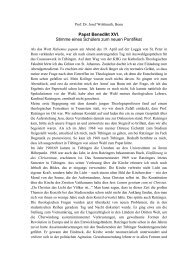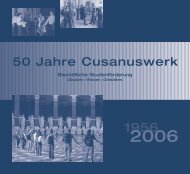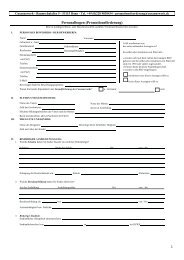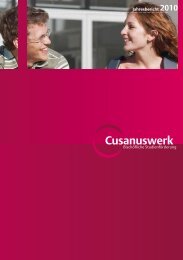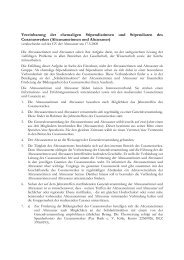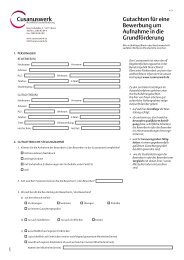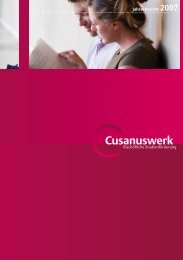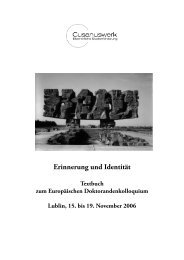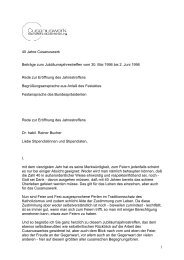Textbuch zur Auslandsakademie Afrique en ... - Cusanuswerk
Textbuch zur Auslandsakademie Afrique en ... - Cusanuswerk
Textbuch zur Auslandsakademie Afrique en ... - Cusanuswerk
Erfolgreiche ePaper selbst erstellen
Machen Sie aus Ihren PDF Publikationen ein blätterbares Flipbook mit unserer einzigartigen Google optimierten e-Paper Software.
harder th<strong>en</strong> in the WTO. The economic<br />
partnership agreem<strong>en</strong>ts (EPAs) dealing with<br />
the Singapore issues (competition, public<br />
procurem<strong>en</strong>t, investm<strong>en</strong>t, administrative<br />
trade facilitation) which are strongly rejected<br />
by developm<strong>en</strong>t countries in WTO<br />
negotiations. This will lead towards brought<br />
op<strong>en</strong>ing of markets, lack of tax rev<strong>en</strong>ue and<br />
a heavy burd<strong>en</strong> for national industrialisation<br />
in developing countries.<br />
In the EU it is widely accepted that former<br />
colonial powers play a leading role in<br />
policy issues towards the respective country.<br />
There is no official reaction against a<br />
(miss?) leading role of Fr<strong>en</strong>ch political (and<br />
military) advisors in the Cameroonian<br />
governm<strong>en</strong>t. There is no authorized Cameroonian<br />
negotiator. The Economic Commission<br />
of Africa (ECA) holds the negotiations<br />
with the EU for the C<strong>en</strong>tral-African region.<br />
A team financed by the UN with international<br />
experts sits in Yaoundé the capital of<br />
Cameroon on behave of Cameroon, C<strong>en</strong>tral<br />
African Republic, Gabon, Chad, Congo,<br />
Equatorial Guinea and Saõ Tomé and Principe.<br />
Germany wants to bring EPAs up on the<br />
ag<strong>en</strong>da during their EU presid<strong>en</strong>cy in the<br />
first half of 2007, wh<strong>en</strong> EPA negotiations<br />
coming to an <strong>en</strong>d. The responsibility for<br />
EPA negotiations is placed in the BMZ,<br />
ministry for developm<strong>en</strong>t cooperation, and<br />
not inside the BMWA, which shows developm<strong>en</strong>t<br />
ori<strong>en</strong>tation.<br />
In the Cotonou Agreem<strong>en</strong>t, actually<br />
much place is dedicated to the civil-society<br />
as partners in the negotiations 5 . This claim<br />
fails in the practice. A consultation from<br />
the Cameroonian governm<strong>en</strong>t doesn’t take<br />
place. A national reunion with participation<br />
of the civil-society int<strong>en</strong>ded in the Cotonou-<br />
Agreem<strong>en</strong>t is postponed since 2003 until<br />
Nov. 2005 by the Cameroonian departm<strong>en</strong>t<br />
of commerce. The first information meeting<br />
betwe<strong>en</strong> Cameroonian Governm<strong>en</strong>t<br />
and Civil Society was held on 25-27 august<br />
2003 a second took place 50 month later on<br />
14. / 15. Nov. 2005. They are called information<br />
seminars and the one-way communication<br />
lacks of contribution and participation<br />
possibilities. The CEMAC-EU negotiation<br />
reunions are more op<strong>en</strong> to civil society<br />
contributions.<br />
Examples of Ag<strong>en</strong>da conflicts<br />
While the Cotonou agreem<strong>en</strong>t is just<br />
„aiming at creating a favourable <strong>en</strong>vironm<strong>en</strong>t<br />
for private investm<strong>en</strong>t“ 6 , is the EU in<br />
the EPA trying to impose the topics: non-<br />
discrimination, op<strong>en</strong> markets, transpar<strong>en</strong>cy<br />
and protection of investm<strong>en</strong>ts. For bilateral<br />
trade agreem<strong>en</strong>ts this is one example for a<br />
unique WTO plus-plus ag<strong>en</strong>da.<br />
The Cotonou Agreem<strong>en</strong>t wants op<strong>en</strong><br />
and transpar<strong>en</strong>t public procurem<strong>en</strong>t as a<br />
means of good governance. The EU is pushing<br />
hard to have op<strong>en</strong>, reciprocal markets<br />
in all public procurem<strong>en</strong>t questions on the<br />
basis of non-discrimination to European<br />
suppliers. No one sees African <strong>en</strong>terprises<br />
on the European procurem<strong>en</strong>t market.<br />
For the Cameroonian market the promotion<br />
and protection of small and medium<br />
sized <strong>en</strong>terprises is important – the EU is<br />
refusing to negotiate this topic.<br />
Free trade and trade liberalisation as aim<br />
in itself is a conflicting issue. While the EU<br />
is promoting free trade as stimulant for<br />
developm<strong>en</strong>t, various studies 7 and several<br />
political voices take this into question. The<br />
loss of import tax rev<strong>en</strong>ue and decreasing<br />
local production will be a burd<strong>en</strong> for the<br />
Cameroonian economy. In the Cotonou<br />
Agreem<strong>en</strong>t alternatives for EPA are scheduled<br />
in Art. 37: If ACP-countries are „not in<br />
a position“ to <strong>en</strong>ter EPAs, but no EU or<br />
CEMAC proposition for alternatives has<br />
se<strong>en</strong> the public.<br />
Ev<strong>en</strong> if the cont<strong>en</strong>t and the style of the<br />
negotiations are under harsh critics from<br />
differ<strong>en</strong>t north and south civil society organisations,<br />
the process itself bears some<br />
b<strong>en</strong>efits. First to m<strong>en</strong>tion the role of civil<br />
society organisations as partner in the developm<strong>en</strong>t<br />
process. Which is new for most<br />
ACP Governm<strong>en</strong>ts but shows already some<br />
mutual b<strong>en</strong>efits. For further discussion processes<br />
in ACP societies and the democratisation<br />
process this can be groundbreaking.<br />
Second the complem<strong>en</strong>tary role of ACP<br />
parliam<strong>en</strong>tarians. The role of parliam<strong>en</strong>tarians<br />
in the political process is weak in<br />
Cameroon. But the regular EP-ECP Joint<br />
Parliam<strong>en</strong>tarian Assemblies, last in Nov.<br />
2005 in Edinburgh gives possibilities for<br />
exchange 8 .<br />
Obstacles in the process<br />
The EU has divided the group of developing<br />
countries, this make their common<br />
position weaker and the aim of regional<br />
integration remains unclear.<br />
Oft<strong>en</strong> the EU negotiates in Cameroon<br />
with Fr<strong>en</strong>ch policy advisors to the Cameroonian<br />
Governm<strong>en</strong>t. Which gives the<br />
negotiations certain stability due to fluctuation<br />
in Cameroonian Ministries, but shows<br />
a lack of real Cameroonian participation.<br />
25



